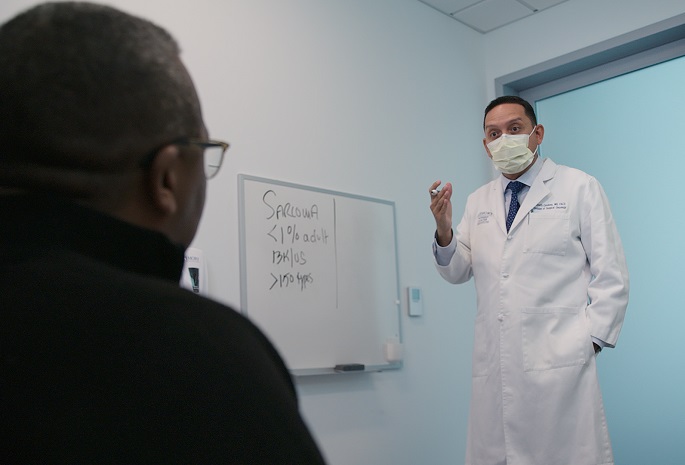Hair Straighteners: What’s the Impact on Uterine Cancer Risk?
So, should you be worried if straighteners are part of your hair maintenance regimen? Here’s what you need to know about the product-related risk — and what you should know about uterine cancer overall.
Hair Straighteners Double the Risk, but the Risk Is Minimal
In a recent National Institutes of Environmental Health Sciences (NIEHS) study with nearly 34,000 women, researchers discovered that women who use hair straightening products are more likely to develop uterine cancer. Applying the products at least four times a year doubles the risk of the disease.
That can sound scary. But it’s important to look at the number of women affected, explains Susan C. Modesitt, MD, leader of the gynecologic oncology program at Winship Cancer Institute of Emory University.
Within the study, only 387 women developed uterine cancer. Based on the results, only 1.64% of women in the study who said they never use the products developed the disease. Among frequent users, the rate rose to 4.05%.
“There’s much attention being given to the increased risk that comes with using these products. But even a roughly double risk is minimal when the risk for women who never use hair straighteners is less than 2%,” she says. “Ultimately, the difference created by these hair straighteners is pretty tiny.”
Cancer care designed around you. And your life.
Learn more about Winship Cancer Institute. Make an appointment online, find a provider or call 404-778-1900 to schedule an appointment.
An Impact on Your Hormones
Hair straighteners do impact your hormones, Dr. Modesitt says. Some ingredients can increase your levels of the sex hormones estrogen and androgen. When you have higher levels, you’re more vulnerable to hormone-related cancers like uterine cancer.
This is especially the case for Black women. They tend to develop more aggressive uterine cancer and are twice as likely as other racial or ethnic groups to die from the disease. Plus, most women who use hair straightening products are Black.
So, even though the risk is small, should you give up this part of your hair care?
“Most people will ask if they should stop using their hair straightener. That’s the million-dollar question, and I don’t have an answer for it,” Dr. Modesitt says. “I think women can feel somewhat reassured that they are not putting themselves at extreme risk using these products. But I do think giving it up is something to think about.”
To better understand your chances of developing uterine cancer, there are many other risk factors and symptoms you should discuss with your doctor during your annual visit to your primary care provider or OB/GYN, she explains.
The Biggest Uterine Cancer Risk Factors
Several factors can increase your risk of developing uterine cancer. There aren’t any screening tests for uterine cancer, so during your well-woman visit, be sure to talk with your doctor about:
- Obesity: Approximately 70% of uterine cancer cases are linked to having a high body mass index (BMI). Too much fatty tissue increases the amount of estrogen your body produces, boosting uterine cancer risk.
- Age: Most cases occur after age 50, with 60 being the average age at diagnosis.
- Race: Even though uterine cancer is more common among white women, Black women develop more aggressive disease and are frequently diagnosed in a more advanced stage.
Other risk factors can include:
- Type 2 diabetes
- History of breast, colon or ovarian cancer
- Tamoxifen use to prevent breast cancer
- Radiation therapy
- Estrogen imbalance
Signs of Uterine Cancer
The number one sign of uterine cancer is abnormal or unexpected vaginal bleeding. If this happens to you, Dr. Modesitt says, you should make an appointment with your doctor.
“If you’re pre-menopausal and suddenly have heavier periods or bleeding between periods, immediately bring it up with your doctor,” she explains. “If you’ve gone through menopause and have any speck of vaginal bleeding at all, make sure you get evaluated for potential cancer.”
Pain or pressure in your pelvis — even without bleeding — is another sign you should mention to your doctor.
Treatment Options
If you’re diagnosed with uterine cancer, the good news is that you have several treatment options. Surgery is frequently the best choice for cancers diagnosed early.
“If women watch out for the signs of uterine cancer, we can catch their cancer very early,” Dr. Modesitt says. “At that point, we can typically cure it with surgery alone. But it’s important to remember that surgery often results in infertility.”
Depending on your diagnosis, your surgical options include:
- Simple hysterectomy: Removal of your uterus and cervix
- Radical hysterectomy: Removal of the uterus, cervix, tissue around the cervix, upper vagina
- Salpingo-oophorectomy: Removal of the fallopian tubes and ovaries
- Lymph node dissection: Removal of the lymph nodes in the pelvis
Your doctor may also recommend radiation therapy and chemotherapy to treat your cancer or reduce the likelihood that it will come back.
The Winship Difference
Winship Cancer Institute of Emory University offers patients the most advanced treatment options. Together, our board-certified, fellowship-trained gynecological specialists are investigating new therapies that offer a more personalized approach to uterine cancer treatment. These include:
- Immunotherapy: Emory currently has two open clinical trials examining the effectiveness of immunotherapy drugs. Both trials — one with the drugs olaparib and cediranib and another with pembrolizumab, paclitaxel and carboplatin — are investigating whether these medications can improve survival in women with uterine cancer that has returned or spread.
- Hormonal therapy: This is not the same hormone therapy given to women who are experiencing symptoms of menopause. Instead, it is for patients still in their childbearing years. At Winship, researchers are actively investigating whether it’s possible to use hormonal therapy to treat early-stage disease without performing a hysterectomy. With this type of treatment, we can potentially preserve fertility.
- Targeted therapy: Researchers at Winship are focusing on specific characteristics of tumors that may make them particularly vulnerable to a variety of available oncology drugs. This approach lets us tailor our treatment to a patient’s individual cancer. As a result, we may be able to treat your cancer with fewer side effects.
Visit the Winship website to learn more about uterine cancer.
Cancer care designed around you. And your life.
About Winship Cancer Institute of Emory University
Dedicated to discovering cures for cancer and inspiring hope, Winship Cancer Institute of Emory University is Georgia’s only National Cancer Institute-designated Comprehensive Cancer Center, a prestigious distinction given to the top tier of cancer centers nationwide for making breakthroughs against cancer. Winship is researching, developing, teaching and providing patients novel and highly effective ways to prevent, detect, diagnose, treat and survive cancer. Cancer care at Winship includes leading cancer specialists collaborating across disciplines to tailor treatment plans to each patient’s needs; innovative therapies and clinical trials; comprehensive patient and family support services; and a care experience aimed at easing the burden of cancer. Winship is Where Science Becomes Hope. For more information, visit winshipcancer.emory.edu.
Related Posts
-
 Sarcomas are rare cancers that begin in bones or soft tissues like muscles, fat, blood vessels or nerves. Because they are rare and there are many different types, they need special care for diagnosis and treatment.
Sarcomas are rare cancers that begin in bones or soft tissues like muscles, fat, blood vessels or nerves. Because they are rare and there are many different types, they need special care for diagnosis and treatment. -
 In observance of World Cancer Day, here are three inspiring stories of cancer survivors treated at Winship Cancer Institute of Emory University.
In observance of World Cancer Day, here are three inspiring stories of cancer survivors treated at Winship Cancer Institute of Emory University. -
 Have you heard of biomarker testing? Learn how these tests can make a big difference in lung cancer survival and outcomes.
Have you heard of biomarker testing? Learn how these tests can make a big difference in lung cancer survival and outcomes.
Recent Posts
-
Dec 11, 2025
-
Dec 8, 2025
-
Dec 3, 2025
-
Nov 17, 2025
-
Nov 14, 2025
-
Nov 10, 2025

